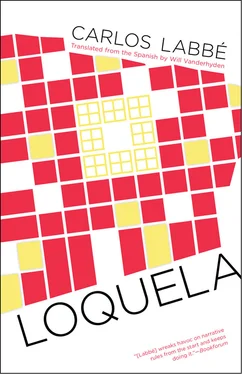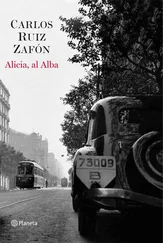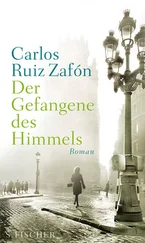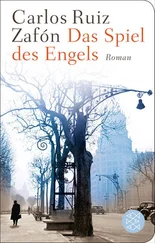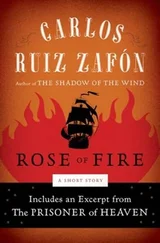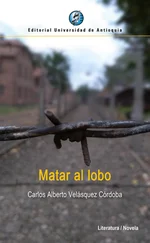But no, I would not have liked growing up without a library in the house. Honestly I’d despise my own ignorance even more, I’d believe in the ability to know everything through reading, I’d be a fucking parody of an academic. What is Alicia reading? I only know what she told me this afternoon: a costume party, a movie, a book all afternoon, and alone. I turned back toward the window and for a moment she was plainly sad, the pain in her bright eyes, the unusual movement of her fingers is unwritable, just like J’s hypocritical smile last night. Did I mention that I saw her — smaller than ever, a shy little girl — on the dance floor? She’s not pretty anymore, her thin waist developed rickets, the neck I sometimes bite in one of my nightmares was a vulgar piece of flesh. (Frightening, today, my inability to hold the pen. I endure getting the shit kicked out of me, like in that dream when I stayed asleep, blood in my eyes, knees to my face, and yet I can’t stay seated throughout the day without perspiring, without my eyes burning and my tongue turning into cloth. Much less read.) Cross off Friday, full moon falling and buried, total darkness, and that’s how it should be, get used to it.
In last night’s dream, Alicia opened her legs for me in a white room. J led me by the hand up the street toward Cerro Santa Lucía, we lay down on the dry grass; Alicia and I were naked, we couldn’t keep from clawing each other’s skin, I could barely breathe through her biting. I clung to both of them desperately, but neither of them was who they seemed to be: Alicia had that particular taste of cigarettes that belonged to J; J’s smile verged on foolishness and malice, like Alicia’s. I prefer to write it like this: confusion, amalgamation, I don’t want either of them except in pieces. Alicia’s ears, J’s mouth, Alicia’s hands, her eyes, J’s chin and torso, Alicia’s hair, again her eyes. The hours go by so fast and are so false, it’s stupid to stay up late when I have a tower of books waiting for me. Dreams don’t matter either, I dream on the surface and thousands of images pass me by without stopping, I don’t laugh or cry, I recognize none of the faces that brush up against me. I wake with the certainty that I’ve been up for three days.

August 30 th
Physically exhausted and mentally ebullient. Absorbed. And I dream: again I find myself in the middle of a classroom at the university, all the desks are empty. Next to me a certain professor is waiting for the rest of the students to arrive, he gives me a friendly look and asks me questions: why do I think attendance is so low, are his lectures inadequate. As usual, I get ready to tell a half-truth, “you lack a certain profundity that approximates something literary, but we’re not really capable of expecting much anyway.” The scene is nothing more than a replica of everyday life; this is something that actually happens to me, I show up too early or move too slowly, such that, when I go to pick up J, I have to wait for her and converse with her father in the living room; or when I drop her off, we take so long saying goodbye that we wake up her little brother or run into her parents coming home from a dinner, a little drunk (them or me), and engage in these bizarre but fraught exchanges about how late or how early we are. The same thing happens to me with my professors, I’m often the first student to arrive, the only one who shows up on time; I greet the professor with a false smile and he takes advantage of the unanticipated intimacy to ask me questions.
Later in the dream we are finishing up a class on some author. The professor has entered into the nervous part of his monologue when he repeats the main ideas in different words, hoping that the charitable voice of some student will offer an opinion or interesting question — he never knows whether he’ll have to end class early. In the end, the professor is quiet, frustrated. Just then, someone questions the typology of the novel’s spaces. Your ideas are plausible, says the professor, but we can’t know whether they’re true, because they involve projecting ourselves beyond the text, to speculate about the couple’s future, which the author denies us in the moment he writes the word “end.” (It seems that I was thinking [in the dream I was thinking, parallel to that discussion], about how the novel was unfair to me, its faithful reader. What happens if I want to follow the day-to-day life of a character who fascinates me, is it possible that I don’t have the right to know if, in Coronation , Mario and Estela manage to escape poverty, make a family, raise a beautiful daughter? But Estela is finished on the penultimate page, when at last the book reveals her to me as an extraordinary woman, it also takes her away from me, takes her right out of my hands, because I long to carry her with me beyond the confines of the paragraph. She’ll never be held by the reader, only by Mario. Alicia, on the other hand: I could get up right now, get on a micro , get off in front of her building, buzz the intercom, go up, she opens the door, surprised; she’s alone, I pull her to me; pressure, tangible and ephemeral desire, if I so desired. All things considered, I know more about Estela than I do about Alicia. And I’m more adventurous with her, of course, it’s easy if the woman is invented, she doesn’t have a body. Saying her name in the flesh, Estela, I don’t feel the death rattles that Alicia provokes, each breath I use to name her is something lost, a wasted chance to hold her, kiss her all over, to speak and to be silent two inches from her face, breathe her tobacco smell before she departs for somewhere else, some faraway place, for Neutria, for old age, where my hands will only touch her in writing.)
Soon another hand goes up among the listeners in the class. A gringa is talking now. In the face of the general stupor, her question, which is heard out of context, seems to reveal a doubt that was burning inside all of us before we came into the classroom; I smile hearing her poorly pronounced Spanish: “Excuse me, professor, but do you know what happened to the student Violeta Drago?” The professor goes pale, looks at the floor, unbuttons the collar of his shirt. He swallows and answers: “It’s good of you to ask. The truth is my conscience won’t let me work. I know Violeta’s hidden story, she was, of course, a very dear student. It’s a tragedy, but I want to assure you that if I didn’t say anything it was only because I didn’t want to get myself in any trouble. Besides, no one has come to me to talk about it, no one has asked me anything.”
(And so, in all my apathetic infatuations, as a reader and as a body, where do I locate the attraction I feel for Violeta? She was a living human being, reliant on blood like myself or any other, and yet she has now become a memory. [And where are the pictures of her, the video footage, the sound of her voice captured on a cassette, her high school yearbook, where is she?] That main character in her deliriums, as fictional as Donoso’s monsters, although she insists they were lived experiences. Alicia moves her head, angry. Would I ever be able to get anywhere near that albino girl — though she has appeared so often in my dreams of white walls in recent nights — if she weren’t dead? The answer is no. Because when she died, the pages she’d written came to me. [Alicia reads this and says not a word.] We living beings are cursed, we can’t know ourselves without the existence of inanimate objects: a novel, a personal diary, a letter. Another paradox: whoever claimed that the dead don’t communicate is the one who is dead.)
In my dream the professor kept on explaining himself. “She showed me a few stories she was writing, very interesting. We met at a café on the fisherman’s cove. She was ridiculously nervous when she showed up, barely hanging onto a pile of loose papers, she told me they were dreams (dreams within the dream), not stories, and that she couldn’t stay to talk because she had to hurry to go help a friend. A friend of hers was going to be killed within a half hour, or have stones thrown at him, or get turned over to the police, I can’t remember. She ran off down the street. I followed her of course, in my car at a safe distance. Suddenly I was stopped by the sound of a gunshot. I saw Violeta and a boy clinging to each other, the boy — I don’t know if you know him — who walks around out on the quad with his books and notebooks; he was pale from the shot, I already said it, from the bullet that had struck Violeta too. The two kids — I really want you to understand this — were staring out at the sea; like they died trying to catch a glimpse of the horizon of Neutria, still on their feet, bleeding out, rigid, entwined, eyes open to the sea. It was a statue, I don’t know if I’m making myself clear: they were the very same statue that’s been down on the waterfront for years, do you get it?
Читать дальше
